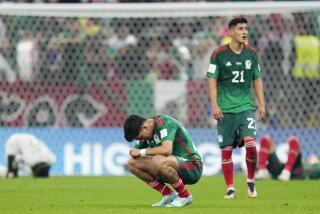Lofty Goals on His Mind
When Major League Soccer eliminated two franchises -- Tampa Bay and Miami -- in January 2002, many thought it signaled the beginning of the end for the league, which has struggled for mainstream acceptance since its inception in 1996.
But MLS Commissioner Don Garber paints a far brighter picture. Garber, who came over from the NFL’s international division to run America’s largest professional soccer league in 1999, has plans for expansion. MLS, which until recently had three owners for the 10-team league, found another in Denver sports entrepreneur Stan Kroenke. And Mexican league power Chivas of Guadalajara has shown significant interest in placing a team in MLS and may join as early as next year.
Garber was in town for the Honda Awards last week and The Times caught up with him.
Question: A lot of people may think that talk of expansion, so soon after contraction, may be a little foolhardy. Why isn’t it?
Answer: Major League Soccer needs to have a bigger presence in this country to achieve our goal of being one of the major [professional sports] leagues in the United States and to be among the major soccer leagues in the world. We’re at 10 teams today because we needed 10 strong teams and we have 10 strong teams. But we need to be a 20-team league and we need to get there bit by bit over the next number of years.
Q: How close to reality is Chivas to joining MLS?
A: Chivas is very real. Jorge Vergara’s interest in Major League Soccer is very, very, very real. His vision for Chivas USA is exciting and would be one of the real opportunities to capture the Hispanic soccer market in the United States. We have some work to do. The biggest challenge is to find the right market for them that can provide the best stadium opportunity and we’re not there yet. So we are still looking in San Diego and looking at a handful of other markets to find the one that we think will provide the greatest opportunity for success.
Q: What about the MLS limit of three international players per team? Chivas prides itself on employing only Mexican players.
A: I think if Chivas comes into the league, we need to find a way to work with them to insure that they can have the personality and the image that has made Chivas so great in Mexico. That doesn’t mean we’re going to have all Mexicans on the team ... but it means we need to have a team that represents and captures the image and the personality of Chivas. We’re still working with Jorge to find that formula that works for them but also works within our system.
Q: Is there a timetable, then, for expansion?
A: We need to very quickly determine whether Chivas is going to come in in ’04 and that time is within the next two weeks. If not, they’ll be part of our two-team expansion plan in 2005 and we have six weeks to finalize all that, but it’s coming down to the wire.
Q: What about other cities and markets?
A: We have a number of markets that have expressed interest, that we are in negotiations with. Cleveland is one, Rochester is another. Oklahoma City is another. Seattle, Philadelphia, Houston are also part of the list.
Q: What does the addition of another owner in Kroenke do for the viability of the league?
A: We’ve not just added a new owner and the first owner ... since 1998 ... [but also] an owner that’s deeply embedded into the sports scene in one of the major markets in this country. A guy that owns a major facility in the Pepsi Center, a basketball team, a hockey team, an arena football team, an indoor lacrosse team, and great plans to really expand his sports holdings in the Denver market.
Q: What about the Home Depot Center? How has it changed the face of soccer not only here, but nationally?
A: When I walk into this facility, I’ve got a bounce in my step and feel a bit like we’ve arrived. And we have been talking about how this sport would arrive in this country now for many years and I think this, with bricks and mortar, speaks to where we are today versus where we’ve said where we wanted to be. We finally have a place that is our home, a home for one of our great [MLS] teams but also home for our national teams, and really, in many ways the home for the sport in this country.
Q: Has it made L.A. the new epicenter of soccer in this country?
A: I think in many ways L.A. has always been the epicenter of soccer in America. It has probably performed as the best MLS market over time. It’s got an explosive youth soccer population ... a massive Hispanic population that’s soccer knowledgeable and involved. It’s got a team that’s got two players that have been part of the team for eight years in Cobi [Jones] and Mauricio [Cienfuegos]. It’s got a championship. And now it’s got the Home Depot Center.
Q: When does MLS become a viable competitor with other leagues around the world?
A: I don’t think our goal is to become a competitor with the other leagues in the world. It’s to be respected and viewed as being among the great soccer leagues in the world. The formula for success in this league will allow for a young fan in this country, a young fan in Los Angeles, to love Chivas or Club America but also love the Galaxy. And our goal is to have them not forget their roots but to embrace their home team.
Q: How does the demise of WUSA affect MLS?
A: I think it affects us in our hearts. We feel for their ownership that’s invested tens of millions of dollars in the sport and we feel for their players that want to have a professional league to play in ... other than that, we just send our wishes out to them and hope that they can get it back together and young kids out there, boys and girls, can look to a viable professional women’s league some time in the future.





